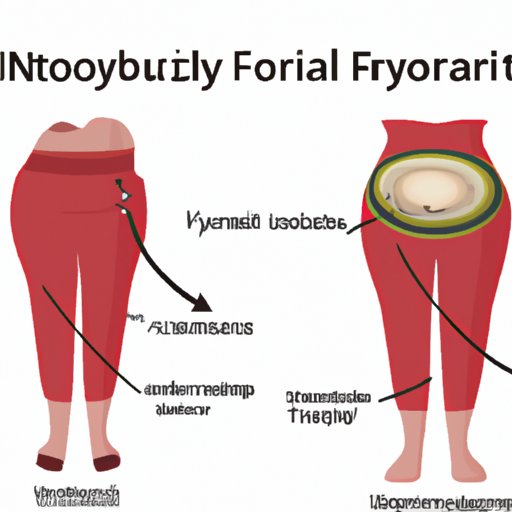
Introduction
Uterine fibroids are a common health issue that affects many women across the world. These non-cancerous growths can appear in or on the uterus and cause a wide range of symptoms, including heavy periods, pelvic pain, and infertility. However, one symptom that is not often discussed is weight gain. In this article, we will explore the connection between uterine fibroids and weight gain, debunk myths, and provide solutions for individuals who are dealing with this challenging symptom.
The Link Between Uterine Fibroids and Weight Gain: What You Need to Know
While the exact cause of weight gain in individuals with uterine fibroids is not fully understood, there are scientific explanations behind the correlation. One theory suggests that the presence of uterine fibroids can lead to changes in hormone levels, which in turn can affect the body’s metabolism and result in weight gain. Additionally, uterine fibroids can cause inflammation, which can also impact the way the body stores and processes fat.
Studies have also found a link between uterine fibroids, weight gain, and obesity. One study published in the American Journal of Epidemiology found that women with uterine fibroids were more likely to be obese than those without the condition. Another study published in the Journal of Women’s Health found that women with uterine fibroids who underwent surgical treatment experienced a significant decrease in body mass index (BMI) and weight.
Managing Weight Gain with Uterine Fibroids: Tips and Tricks
If you are dealing with weight gain as a result of uterine fibroids, know that you are not alone. There are practical steps you can take to manage this symptom and maintain a healthy weight. First and foremost, it is essential to maintain a nutritious and balanced diet. Focus on incorporating whole foods, lean protein, and plenty of fresh fruits and vegetables into your meals. You may also want to consider reducing your intake of processed foods, sugary drinks, and alcohol, which can contribute to weight gain.
Regular exercise is another key component of weight management. Aim for at least 30 minutes of moderate exercise per day, such as brisk walking, cycling, or swimming. Strength training can also help build muscle and boost metabolism. If you are new to exercise, start slowly and gradually increase the intensity and duration of your workouts.
Other lifestyle changes that can help with weight management include getting enough sleep, reducing stress, and avoiding smoking. If you are struggling to maintain a healthy weight, consider seeking support from a healthcare provider or a registered dietitian.
Weight Gain and Uterine Fibroids: Debunking Myths and Providing Solutions
There are several misconceptions surrounding uterine fibroids and weight gain. One common myth is that all women with uterine fibroids will experience weight gain. While weight gain is a symptom that some individuals may experience, it is not universal.
Another myth is that weight gain caused by uterine fibroids cannot be addressed or managed. However, as we discussed earlier in this article, there are practical steps you can take to manage weight gain as a result of uterine fibroids. Additionally, healthcare providers may recommend surgical or non-surgical treatments, such as myomectomy or uterine artery embolization, which can reduce the size and symptoms of uterine fibroids and potentially lead to weight loss.
The Psychological Impact of Weight Gain with Uterine Fibroids
Weight gain can have a significant emotional and mental impact on individuals with uterine fibroids. It can lead to feelings of shame, low self-esteem, and depression, which can further exacerbate the issue. If you are struggling with the psychological impact of weight gain, know that there are resources available to help.
Counseling, therapy, and support groups can all provide a safe space for individuals dealing with the emotional toll of uterine fibroids and weight gain. Additionally, practicing self-care and self-compassion can help alleviate some of these challenging feelings. Engage in activities that bring you joy and satisfaction, such as reading, painting, or spending time with loved ones. Remember that you are not defined by your weight, and you are deserving of love and respect, no matter your size or shape.
Expert Advice: How to Talk to Your Doctor About Uterine Fibroids and Weight Gain
If you are concerned about weight gain as a result of uterine fibroids, it is essential to have an open and honest conversation with your healthcare provider. They can provide accurate information, recommend treatments, and help you manage your symptoms.
Before your appointment, make a list of any questions or concerns you may have. Consider asking about potential treatments, lifestyle changes, and any risks associated with uterine fibroids and weight gain. You may also want to ask for a referral to a specialist, such as a gynecologist or endocrinologist, who can provide specialized care and expertise.
Conclusion
Weight gain can be a challenging and distressing symptom for individuals dealing with uterine fibroids. However, there are resources and solutions available to help manage this issue and promote overall health and well-being. By incorporating healthy lifestyle changes, seeking support from healthcare providers and loved ones, and practicing self-care, you can take control of your health and navigate the challenges that come with uterine fibroids.
If you are dealing with weight gain as a result of uterine fibroids, don’t hesitate to reach out for support. Remember that you are not alone, and there are solutions available to help you through this challenging symptom.




